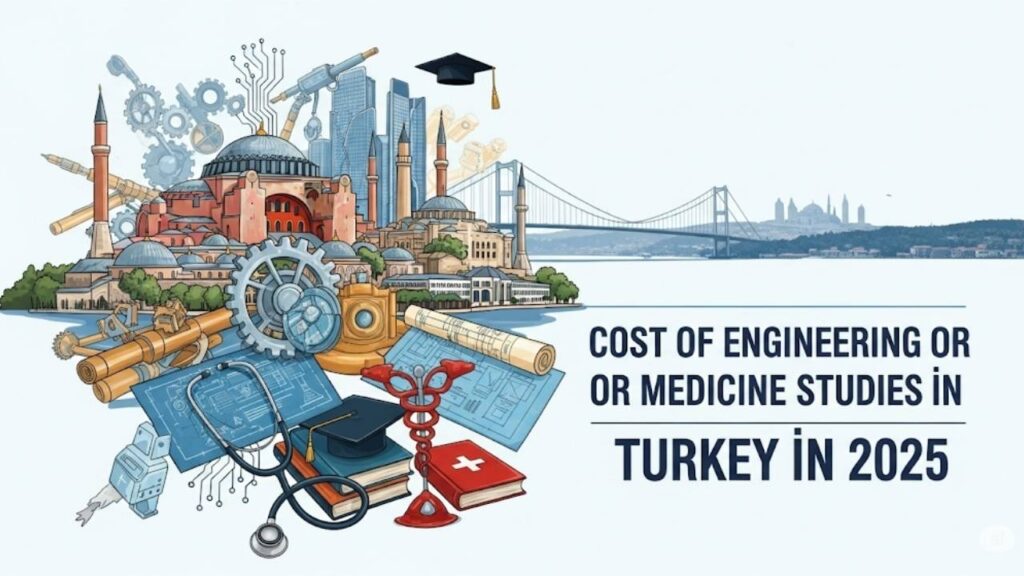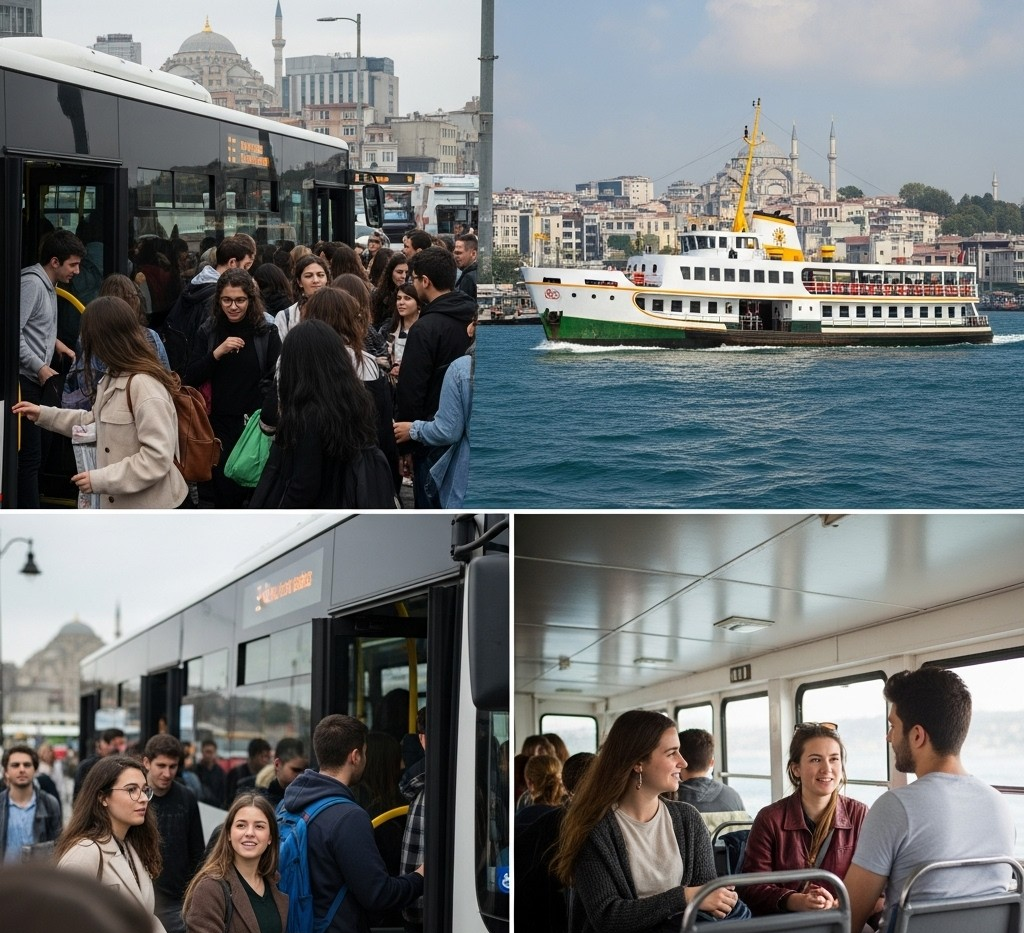Dreaming of a world-class education in engineering or medicine without the hefty price tag? Look no further than Turkey! As a seasoned writer on international education, I’ve seen countless students successfully navigate the path to obtaining highly respected degrees in Turkey, and I’m here to tell you it’s not just a dream – it’s an achievable reality. This article will provide comprehensive, actionable, and encouraging information on the Cost of Engineering or Medicine Studies in Turkey in 2025, helping you understand and successfully navigate the process.

Turkey, with its rich history, vibrant culture, and strategic location, has emerged as an increasingly popular destination for international students. Its universities offer robust academic programs, particularly in sought-after fields like engineering and medicine, often at a fraction of the cost found in Western countries. This affordability, coupled with a high standard of education, makes Turkey an incredibly attractive option for aspiring professionals.
Unpacking the Costs: Tuition Fees for 2025
The cost of your studies in Turkey will largely depend on whether you choose a public or private university and the language of instruction (Turkish or English). Generally, public universities are significantly more affordable.
Engineering Studies: Building Your Future Affordably
For aspiring engineers, Turkey presents a compelling case. The tuition fees for engineering programs in 2025 vary, but remain remarkably competitive.
- Public Universities: You can expect to pay anywhere from $500 to $2,500 USD per year for engineering programs at public universities. For instance, at Middle East Technical University (METU), a highly regarded institution, engineering programs are around $1,500 USD per year. Hacettepe University, another excellent public option, lists engineering programs for international students at approximately $1,000 – $1,500 USD per year.
- Private Universities: While generally more expensive, private universities still offer competitive rates compared to other study destinations. Tuition fees for engineering at private institutions typically range from $1,500 to $12,500 USD annually. Some of the more affordable private options include Beykoz University, with engineering programs starting around $1,950-$2,448 per year, and Yeni Yüzyıl University, where fees can range from $2,000-$3,500 annually. For those seeking English-taught programs at private universities, fees can range from $2,000 to $40,000 annually, with a notable example being Istanbul Medipol University at the higher end.
Beyond Tuition: Estimating Your Living Expenses
Beyond tuition, understanding your living costs is crucial for a complete financial picture. The cost of living in Turkey is significantly lower than in many European or North American countries, especially outside of major cities.

Average Monthly Living Expenses (2025)
For a single student, the average monthly cost of living in Turkey in 2025 is estimated to be around $400 to $800 USD, excluding tuition. This figure can fluctuate based on your lifestyle and the city you choose.
- Accommodation:
- University Dormitories: Often the most affordable option, ranging from $100 to $400 USD per month, depending on the city and facilities. In my experience advising students, university dorms fill up quickly, so early application is key!
- Shared Apartments: Rent for a shared apartment can be around $150-$400 USD per month per person, especially in cities like Istanbul.
- Private Apartments (1-bedroom): In city centers, a 1-bedroom apartment can cost around $1,100 USD in Istanbul and $550-$850 USD in Ankara. Outside city centers, these costs decrease to approximately $750 USD in Istanbul and $350-$600 USD in Ankara.
- Food: Monthly grocery costs for a single person typically range from $150 to $250 USD. Eating at local restaurants is generally inexpensive, with an inexpensive meal costing around $8.62 USD in Istanbul.
- Transportation: Public transportation in Turkish cities is efficient and affordable.10 A monthly pass can cost approximately $20 to $45 USD, with student discounts often available.
- Utilities & Internet: For an 85 sqm apartment, basic utilities (electricity, heating, water, garbage) can range from $50 to $100 USD per month. Internet costs around $10 to $15 USD monthly.
- Health Insurance: Basic health insurance for students can range from $50 to $100 USD per month.
Here’s a general breakdown of average monthly costs in major student cities
| City | Average Monthly Cost (USD, excluding tuition) | Accommodation (Dorm/Shared) | Food & Groceries | Transportation (Monthly Pass) |
| Istanbul | $900 – $1,500 | $100 – $500 | $150 – $250 | $20 – $45 |
| Ankara | $600 – $1,000 | $100 – $400 | $150 – $250 | $15 – $35 |
| Izmir | $600 – $1,000 | $100 – $400 | $150 – $250 | $15 – $35 |

Scholarships: Making Your Dream Even More Attainable
One of the most encouraging aspects of studying in Turkey is the availability of scholarships that can significantly reduce your financial burden, or even cover your entire education! I’ve seen many successful applicants focus on securing these invaluable opportunities.
Türkiye Scholarships (Turkiye Bursları): Your Golden Ticket
The most prominent and sought-after scholarship program is the Turkish Government Scholarship, known as Türkiye Bursları. This is a fully funded scholarship for international students pursuing undergraduate, master’s, and Ph.D. programs, including engineering and medicine.
What it covers
- Full tuition fees
- Monthly stipend (e.g., around 1,000 TL for undergraduate, 1,400 TL for master’s, 1,800 TL for Ph.D. students – subject to change)
- Return flight ticket
- Health insurance
- Accommodation support (often in university dormitories)
- One-year Turkish Language Course
Eligibility Highlights (2025)
- Applicants from all countries are eligible.
- Minimum academic achievement: 70% for Bachelor’s, 75% for Master’s/Doctorate, and 90% for Health Sciences (Medicine, Dentistry, Pharmacy).
- Age criteria: Under 21 for undergraduate, under 30 for master’s, under 35 for doctorate.12
University-Specific Scholarships
Many Turkish universities also offer their own scholarships to international students, often based on academic merit or financial need. It’s highly recommended to check the individual university websites for specific scholarship opportunities in engineering and medicine. These can be partial or full scholarships.
The Application Process: Navigating Your Way In
While the focus here is on cost, understanding the general application process is key to securing your spot.
- Academic Requirements: A high school diploma (or equivalent) with strong academic records is essential. For medicine, especially, a very high average score (often 90% or above for Türkiye Scholarships) is typically required.
- Language Proficiency: Depending on the program and university, you’ll need to demonstrate proficiency in either Turkish (often through a TOMER exam) or English (TOEFL, IELTS). Many universities offer a preparatory year for language if you don’t meet the requirements upfront.
- Entrance Exams: Some public universities, particularly for highly competitive programs like medicine, may require you to take the YÖS (Foreign Student Examination) or accept international exams like SAT or ACT. Private universities often have their own admission criteria.
Why Turkey? A Holistic Investment
Choosing Turkey for your engineering or medicine studies is not just a financial decision; it’s an investment in a rich cultural experience and a globally recognized education. You’ll be part of a dynamic and diverse student community, benefit from modern university facilities, and gain invaluable international exposure.
Charting Your Path to Excellence: University of Cambridge Research Fellowships 2026
Your Bridge to Discovery: The Ultimate Guide to the Canon Foundation Research Fellowships 2026
FAQ
Q1: Are medical degrees from Turkish universities recognized internationally?
Yes, medical degrees from accredited Turkish universities are widely recognized internationally, particularly within Europe and by many medical councils globally.16 It’s always advisable to check the specific recognition requirements of your home country or the country where you intend to practice.
Q2: Can I work part-time while studying in Turkey?
International students in Turkey are generally allowed to work part-time after their first year of study, with certain restrictions. However, for demanding fields like medicine and engineering, focusing on your studies is highly recommended.
Q3: What is the average application fee for Turkish universities?
Application fees vary by university but are generally modest. For some public universities, it can be around $30-$50 USD. Some scholarship applications, like Türkiye Bursları, do not have an application fee.
Q4: Is it necessary to learn Turkish if I study in English?
While not strictly necessary for English-taught programs, learning basic Turkish phrases will significantly enhance your daily life and cultural immersion. Many universities offer free or affordable Turkish language courses for international students.
Q5: What is the minimum academic requirement for engineering or medicine studies in Turkey?
For engineering, a minimum academic achievement of 70% in your high school diploma is generally recommended. For medicine, especially for competitive scholarships like Türkiye Bursları, a minimum of 90% academic achievement is often required, demonstrating the highly selective nature of medical programs.










